Police report on SNP finances probe due 'within weeks'
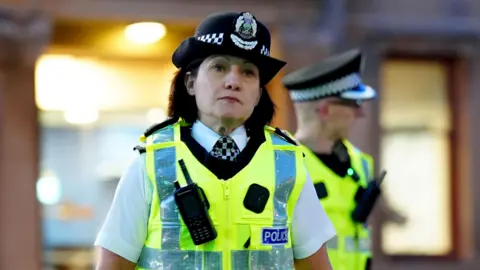 PA
PADetectives investigating the SNP's finances will report their findings to prosecutors within "a matter of weeks", according to Police Scotland's chief constable.
Jo Farrell declined to say whether anyone else will face charges alongside the party's former chief executive Peter Murrell, who has been accused of embezzling SNP funds.
In a wide ranging interview, her first since taking the post last October, the chief constable said she wanted her officers to stop carrying out welfare checks on people with mental health issues.
Ms Farrell also repeated an apology to a former police officer who was sexually assaulted by a colleague.
And she defended the force’s refusal to speak to the media when Scotland's controversial hate crime legislation was introduced on 1 April.
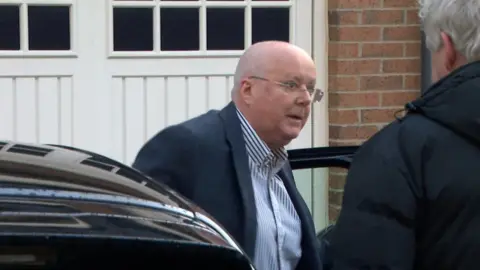
Operation Branchform, the investigation into the SNP's funding and finances, was launched in July 2021.
Last April it led to the arrests of Mr Murrell and the party's former treasurer Colin Beattie.
And in June former First Minister Nicola Sturgeon, who is married to Mr Murrell, was also arrested.
All three were later released without charge.
But last month Mr Murrell was charged in connection with the embezzlement of funds from the SNP.
Detectives based at the Scottish Crime Campus at Gartcosh have been working on the case in consultation with prosecutors from the Crown Office and Procurator Fiscal Service (COPFS).
Officers are finalising what's known as a standard prosecution report, detailing their findings and laying out their evidence.
Asked when the report will be sent to the Crown Office, the chief constable said: "I anticipate that will happen in a matter of weeks."
Lawyers at the Crown Office will then decide whether the case should go to court.
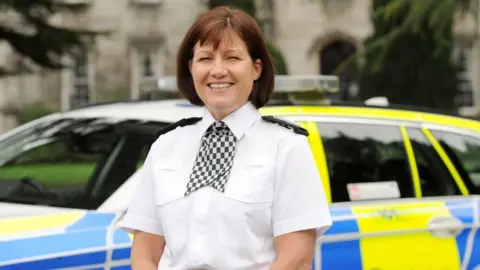 Police Scotland
Police ScotlandJo Farrell became commanding officer at the UK’s second largest police force last October after four years in charge of one of the smallest, Durham Constabulary.
She had no previous experience of policing in Scotland and her appointment surprised many.
Within weeks of taking up the post it emerged that she had used a police car to get her home to the North of England during Storm Babet.
The chief had to issue a public apology at her first appearance before the board of the Scottish Police Authority, the body which had just given her the job.
It was painful to watch and a distraction from the chief's main message that day, which was an argument for increased funding from the Scottish government.
Faced with a recruitment freeze, a shrinking workforce and growing operational pressures, Ms Farrell asked for a £128m budget uplift and succeeded in getting an extra £104m.
Recruitment restarted but the force still has the lowest number of officers for 15 years.
Seven months after taking the top job, carrying out a round of media interviews in a Glasgow police station, the new chief’s central message was that officers must be allowed to concentrate on policing.
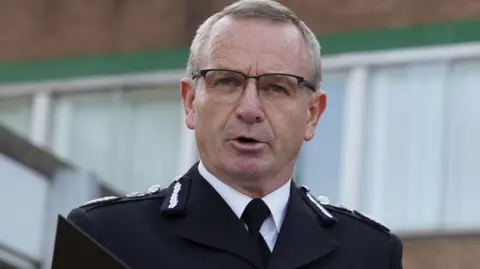 PA Media
PA MediaPolice Scotland say that every year, they respond to more than 100,000 mental health incidents - only 13% of which involve a crime.
On busy days, a call related to mental health comes in every two or three minutes.
In England, many forces have adopted a new approach and are only responding to mental health incidents when a crime has been committed or there is an immediate threat to life.
Ms Farrell says she does not want to go that far but argues that Police Scotland must no longer be asked to carry out the routine work of other agencies.
Asked if she wanted her officers to stop carrying out welfare checks on people with mental health problems, she replied: "Absolutely."
"Our involvement in mental health incidents and supporting vulnerable people has a significant impact on this organisation and is way beyond where policing should be.
"We're the ones who have to deal with house breaking, online sexual abuse, fraud, cyber crime, domestic abuse, serious and organised crime. We're the only ones who do that."
Ms Farrell also wants to reduce the time officers spend in courts, waiting to be called for trials which don't go ahead.
"Mental health and the courts are the two big issues that are drawing officers away from frontline policing.
"I would say roughly a third of the officers who're called to court are on a rest day or annual leave and that impacts on their well being and their work life balance.
"My conservative estimate is that only 15% end up giving evidence."
Work is underway to reduce the demand on the police from mental health calls and the amount of time they spend in courts.
When she took charge last year, Ms Farrell said she supported the statement of her predecessor, Sir Iain Livingstone, that the force was institutionally discriminatory.
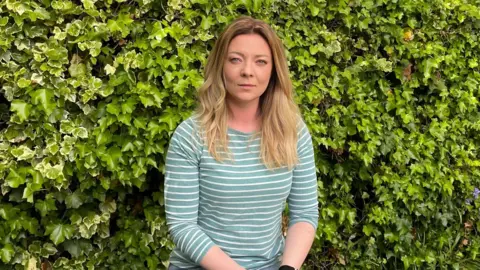
On the day she spoke to the media, BBC Scotland News had revealed that a former officer had accepted a £431,968 payout from Police Scotland.
Gemma MacRae had been sexually assaulted by a colleague and had complained about bullying and misogyny at Forres police station in Moray.
She first made the allegations seven years ago and left the force in 2021.
"Quite clearly the behaviour, the attitude, the actions that she suffered are quite frankly disgusting and have no place in Police Scotland," said Ms Farrell.
"The vast proportion of people in the organisation will feel exactly the same as I do."
Gemma MacRae told the BBC she felt like she had been banging her head off a brick wall during the process and it would still be "career suicide" to raise complaints.
"I recognise what Gemma is saying there and we have got more work to do," said the chief constable.
Ms Farrell added the force intends to get back to having 16,600 officers this year and is "laser focussed" on frontline policing while looking for "efficiencies" elsewhere.
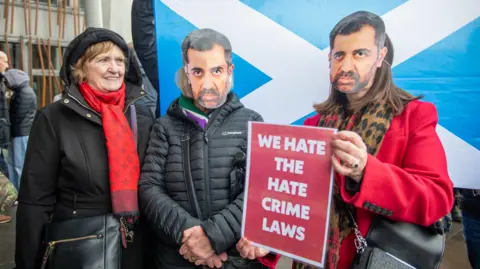 PA
PAOperation Branchform aside, the biggest challenge to the force during her tenure has been the introduction of the Hate Crime and Public Order (Scotland) Act.
The controversy over the legislation attracted international attention but the force refused all requests for interviews from the media.
None of its highly paid, highly experienced senior officers was put forward to explain how the force would interpret the law or handle complaints.
From the outside, it looked like a bunker mentality had set in. Ms Farrell disagrees.
"We made a very deliberate decision that we would wait and see how it settled down," she said.
"Very early on it was very impactful but it quickly settled back to what I would call the new norm in terms of reports coming in."
It is far too early to tell whether the new chief constable will make an impact on the force's many challenges, old and new.
The Scottish Police Federation said she is saying the right things but the big question is whether she can deliver.
